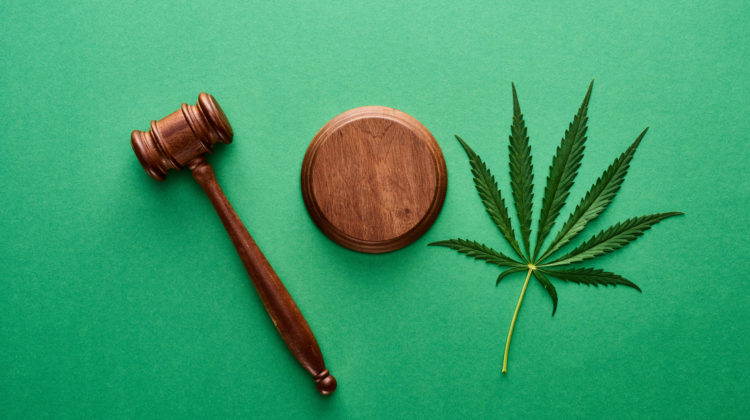
Indiana Democrats pursue joining neighboring states in cannabis legalization. Photo Credit: LightFieldStudios.
The Indiana Democratic Party has recently made efforts to push the legalization of medical and recreational cannabis within the state.
The party made the announcement on November 15th. In it, they said they plan to introduce multiple forms of legalization in the Indiana General Assembly session in 2022, which aligns with the state’s residents’ support for legalization.
Why the Push?
It’s no secret that the country and its citizens are finally changing their opinion on cannabis. In the U.S., a total of 18 states have legalized recreational use, and 36 have legalized medicinal usage. Legal states have seen various benefits as a result.
According to the Indiana Democratic Party, legalization “would provide the opportunity to create an additional revenue stream for the state, create good-paying jobs, develop a long-term cash crop for Indiana’s ag and business communities, provide medicinal opportunities for people like the state’s veterans and seniors, and could start the process of expunging records for simple possession across the state.”
However, it’s clear that republican Indiana Gov. Eric Holcomb is not on board with the democrats. In fact, he explained that he would not support legalization until the federal government ended prohibition.
In response, the Indiana Democratic Party says that waiting on the federal government to legalize cannabis contradicts the “local government” approach by both Indiana Democrats and Republicans. They also state it will set the state’s economic and manufacturing opportunities behind the rest of the nation once nationwide legalization becomes reality.
The party additionally states that legalizing cannabis is a win-win for Indiana, and it should get done this legislative session. If the Republicans fail to join Democrats in this effort, it will become a hallmark issue for the 2022 state and midterm elections.
Today’s Support
Both medical and recreational cannabis use in Indiana is illegal. Currently, hemp-derived cannabinoids and products including CBD are legal in the state. Additionally, they are legal across the nation, as long as they contain no more than 0.3% THC.
Regarding cannabis, any amount of possession is illegal. Possession of 30 grams or less constitutes a misdemeanor, and any amount over is a felony. Additionally, the sale and cultivation follows the same criminal code.
However, Indiana police may loosely enforce it. For example, in 2019, the Marion County Prosecutor’s Office announced it would not prosecute “simple marijuana” charges, reports WTHR News. Since then, county officials dismissed hundreds of cases for people picked up for having an ounce or less of cannabis.
While there are both republicans and democrats that have shown no support of cannabis legalization; the general population believes that republicans typically are against the drug.
Indiana is a republican stronghold, and has been for years. Red governors have run it since 2005. This is set to continue at least until the current governor’s term ends in 2025.
Politics aside, the majority of Indiana residents are ready for cannabis freedom. An Old National Bank and Ball State University poll from 2018, for example, shows that 81% of all Indiana residents support some form of cannabis legalization. Additionally, 39% support legal recreational use; 42% support legal medical use; and only 16% think the plant should remain illegal.
Indiana is just one of 14 U.S. states that have no effective medical or recreational cannabis laws.
Outside Influence
While Indiana remains strict on cannabis, neighboring states may have a potential influence on the Hoosier State. For instance, neighboring states with legal medical or recreational cannabis may help give lawmakers the nudge they need.
Michigan legalized recreational cannabis use in 2018. Since then, the state has seen substantial economic benefits from it.
According to ABC’s UpNorthLive, one in five Michiganders reported cannabis use in the past year, resulting in nearly $1 billion in legal sales in 2020. Additionally, Michigan had a nearly $3.2 billion cannabis market in 2020, with nearly 400 licensed medical provisioning centers and 300 licensed adult-use retail stores. The regulated cannabis industry generated $169 million in tax and fee revenues in 2020.
Illinois legalized recreational cannabis at the start of 2020. Similar to Michigan, the state has also seen overwhelming economic benefits as a result.
Marijuana Moment states that Illinois cannabis retailers have sold nearly $1 billion worth of legal recreational cannabis products so far in 2021. Additionally, Illinois sold about $670 million last year and took in $205.4 million in tax revenue.
Regarding Ohio, recreational cannabis remains illegal. But medical usage was made legal in 2016 and took effect in 2019. Crain’s Cleveland Business states that Ohio is on pace for nearly $400 million in sales in 2021.
According to Statista, Indiana’s CBD market generated $27 million in 2019.
“The economic boom in the surrounding states should be a big reason to legalize it [cannabis]… and I know tons of people that would agree with that. People shouldn’t have to drive across the border to get it,” Frank Mescutti, a long-time Indiana resident, told Emerald.
In fact, WTHR reports that, at a dispensary 8 miles north of the Indiana border, “the majority of cars in the crowded parking lot had Indiana license plates.”
Fingers Crossed
Despite lawmakers’ proposed efforts, the future of cannabis legalization in Indiana remains uncertain.
At this point, it’s up to the Indiana Democratic Party to make a convincing effort to hop on the legal cannabis train.
Politics aside, it’s been made very clear that the majority of the state’s citizens are onboard with some form of cannabis legalization. Not only has it proven to lead to economic benefits, but will also provide those in need of an alternative treatment to a variety of illnesses.
While the people of Indiana may not see the change they want anytime soon, the efforts being made will be heard not only by the state but across the country.



Leave a Reply